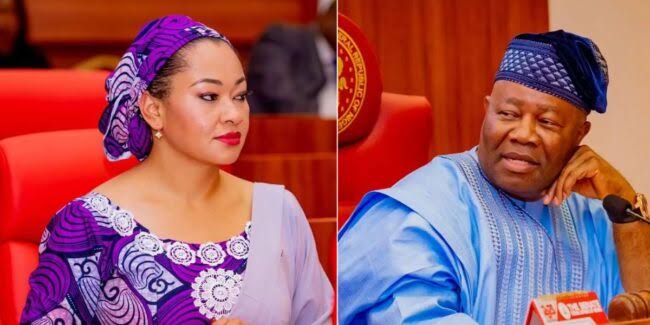Senator Natasha Akpoti-Uduaghan’s Allegations of Sexual Harassment Against Senate President Godswill Akpabio: A Detailed Account of the Legal Battle
Senator Natasha Akpoti-Uduaghan, representing Kogi Central, has leveled accusations of sexual harassment against Senate President Godswill Akpabio, sparking a contentious legal battle. The allegations, initially brought to light through a formal complaint, have escalated into a public exchange between Akpoti-Uduaghan and Akpabio’s legal counsel, Olisa Agbakoba, a Senior Advocate of Nigeria (SAN). This detailed account examines the unfolding events, the legal arguments presented by both sides, and the potential implications of this high-profile case.
The controversy began when Akpoti-Uduaghan filed a complaint alleging that Akpabio had subjected her to sexual harassment. Details regarding the specific nature of the alleged harassment and the context in which it occurred have not been fully disclosed publicly, as the matter is currently under judicial consideration. Following the initial complaint, Agbakoba, representing Akpabio, sent a letter to Akpoti-Uduaghan demanding a retraction of the allegations, characterizing them as "clearly false and unsubstantiated." He further argued that inconsistencies existed within her account and requested clarification.
In response, Akpoti-Uduaghan issued a firm rebuttal, standing by her allegations and asserting that they accurately represent the events as she experienced them. She criticized Agbakoba’s demand for further substantiation outside the formal legal proceedings, particularly referencing a related lawsuit filed by Akpabio’s spouse, Unoma, against Akpoti-Uduaghan (Suit No. CV/816/25 at the High Court of the FCT). Akpoti-Uduaghan argued that the proper venue for evaluating evidence and determining the veracity of the claims is within the court system, not through public exchanges or media statements.
A key point of contention raised by Akpoti-Uduaghan is the perceived double standard in Akpabio’s approach. She highlighted the irony of Akpabio, through his counsel, demanding public proof while simultaneously using his position to prevent the matter from being addressed within the Senate. Akpoti-Uduaghan argued that this behavior represents an attempt to manipulate public perception and circumvent the established legal processes. She emphasized the importance of respecting the court’s authority to adjudicate the matter and warned against undermining the rule of law through parallel public campaigns.
Akpoti-Uduaghan also raised concerns about the broader understanding of sexual harassment, suggesting that Agbakoba’s demands reflect a limited perspective on the complexities of such cases. She argued that the pursuit of "proof" in this context can be inherently problematic and may perpetuate misconceptions about the nature of sexual harassment. She maintained that further details would be provided through the standard legal disclosure process, guided by the court’s directions.
The legal back-and-forth between the two parties underscores the sensitivity and complexity of sexual harassment allegations, particularly when they involve high-profile individuals. Akpoti-Uduaghan’s insistence on pursuing the matter through the courts highlights the importance of due process and the need for a fair and impartial evaluation of the evidence. Her critique of Akpabio’s alleged attempts to influence public opinion through his counsel raises questions about the potential impact of power dynamics and public perception on the pursuit of justice in such cases.
The ongoing legal battle between Akpoti-Uduaghan and Akpabio promises to be closely watched. The outcome of the case could have significant implications not only for the individuals involved but also for the broader conversation surrounding sexual harassment, accountability, and the challenges of navigating power imbalances within political and social spheres. The case also highlights the delicate balance between the right to a fair trial and the public’s right to information in matters of public interest. As the legal proceedings unfold, the intricacies of the allegations, the evidence presented, and the court’s interpretation of the law will be critical in determining the final outcome.














